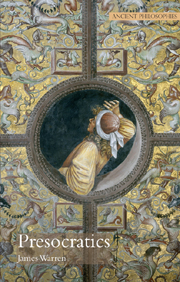Book contents
- Frontmatter
- Contents
- Acknowledgements
- Sources and abbreviations
- Chronology
- Map of the ancient Mediterranean
- 1 Introduction: reading Presocratic philosophy
- 2 Ionian beginnings
- 3 Xenophanes
- 4 The oracles of Heraclitus
- 5 Parmenides
- 6 Reactions to Parmenides
- 7 Anaxagoras
- 8 Empedocles
- 9 Democritus and Leucippus
- 10 Epilogue
- Guide to further reading
- Notes
- Bibliography
- Index of passages
- Index
3 - Xenophanes
- Frontmatter
- Contents
- Acknowledgements
- Sources and abbreviations
- Chronology
- Map of the ancient Mediterranean
- 1 Introduction: reading Presocratic philosophy
- 2 Ionian beginnings
- 3 Xenophanes
- 4 The oracles of Heraclitus
- 5 Parmenides
- 6 Reactions to Parmenides
- 7 Anaxagoras
- 8 Empedocles
- 9 Democritus and Leucippus
- 10 Epilogue
- Guide to further reading
- Notes
- Bibliography
- Index of passages
- Index
Summary
Xenophanes of Colophon is principally of interest for his contributions to two areas of thought: theology and epistemology. It is also important to recognize how the two areas are linked. We shall begin by looking at the fragments that relate to his discussion of the gods and then turn to his claims about the possibility of knowledge and the proper method of enquiry. Then we can ask if his theological claims can illuminate the general method he proposes.
Diels and Kranz divide his work into a number of sections: the elegiac poems (DK21 B1–9), the satirical works or Silloi (B10–22), and the fragments On Nature (B23–41), all of which are in verse but in differing metrical forms. However, we have no reason to think that he did not intend his works to offer a single and unified account of the world. Certainly, the “elegiac poem”, B1, apparently composed for performance at a symposium, an after-dinner male drinking party, stresses the need for proper respect for and conduct towards the gods, a theme that also appears prominently in some of the more obviously philosophical fragments. It also recommends that a good after-dinner performance should not recount tales from mythology of battles between Titans, Giants and centaurs, since these serve no useful educational purpose (lines 19–23). Concerns about the ethical content of much traditional poetry are also expressed in other fragments.
- Type
- Chapter
- Information
- Presocratics , pp. 41 - 56Publisher: Acumen PublishingPrint publication year: 2007



